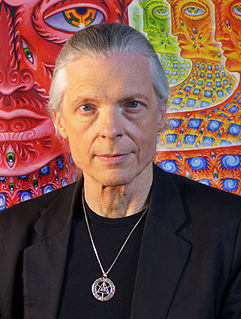A Quote by Antony Flew
You cannot ... transmute some incoherent mixture of words into sense merely by introducing the three-letter word "God" to be its grammatical subject.
Related Quotes
God cannot suffer - at least not as we do. It has some roots in Greek philosophy: if God is a perfect being, suffering would reduce that perfection, so God cannot suffer. More thoughtful theologians take the phrase in the sense of one of the confessions of faith that talks of God as being "without parts or passions" - he is not physical as we are, and not subject to "passions" in the sense of uncontrollable emotions that can take charge of us at times. God is not "emotional," if that word is used as some kind of weakness.
My favorite six letter word is always because it promises so much. My favorite five letter word is never because it insists on contradicting the promise. My favorite four letter word is once because it says it happened then. My favorite three letter word is yes because I’m just now learning to say it to my heart. My favorite two letter word is if because it makes all things possible like this: If not always If not never Then once. Yes.
The continually progressive change to which the meaning of words is subject, the want of a universal language which renders translation necessary, the errors to which translations are again subject, the mistakes of copyists and printers, together with the possibility of willful alteration, are themselves evidences that human language, whether in speech or print, cannot be the vehicle of the Word of God.
A single word that can be offensive to someone is a horrible thing for anyone who has iman. In other words, filthy language out of your mouth and faith inside your heart cannot coexist. You cannot have iman in your heart and ugly words come out of your mouth. If you have no control over whatever four letter words you keep using every time you get frustrated, there's a spiritual problem, it's not just a habit problem.
How can you use a terrible word for anyone who has iman?
Love takes off the masks that we fear we cannot live without and know we cannot live within. I use the word "love" here not merely in the personal sense but as a state of being, or a state of grace - not in the infantile American sense of being made happy but in the tough and universal sense of quest and daring and growth.
For there have risen many who have given to the plain words of Holy Writ some arbitrary interpretation of their own, instead of its true and only sense, and this in defiance of the clear meaning of words. Heresy lies in the sense assigned, not in the word written; the guilt is that of the expositor, not of the text.
The notion of the perfect whole, the ultimate solution in which all good things coexist, seems to me not merely unobtainable--that is a truism--but conceptually incoherent. ......Some among the great goods cannot live together. That is a conceptual truth. We are doomed to choose, and every choice may entail an irreparable loss.
The words and lives of Christian men must be in continual process of reformation by the written Word of their God. This means that ecclesiastical traditions and private theological speculations may never be identified with the word which God speaks, but are to be classed among the words of men which the Word of God must reform.
The Bible is the written word of God, and because it is written it is confined and limited by the necessities of ink and paper and leather. The Voice of God, however, is alive and free as the sovereign God is free. 'The words that I speak unto you, they are spirit, and they are life.' The life is in the speaking words. God's word in the Bible can have power only because it corresponds to God's Word in the universe. It is the present Voice which makes the written word powerful. Otherwise it would lie locked in slumber within the covers of a book.
Words are substance strange. Speak one and the air ripples into another's ears. Write one and the eye laps it up. But the sense transmutes, and the spoken word winds through the ear's labyrinth into a sense that is no longer the nerve's realm. The written word unfolds behind the eye into the world, world's image, and the imagination sees as the eye cannot see-thoughtfully.
Perhaps randomness is not merely an adequate description for complex causes that we cannot specify. Perhaps the world really works this way, and many events are uncaused in any conventional sense of the word. Perhaps our gut feeling that it cannot be so reflects only our hopes and prejudices, our desperate striving to make sense of a complex and confusing world, and not the ways of nature.









































